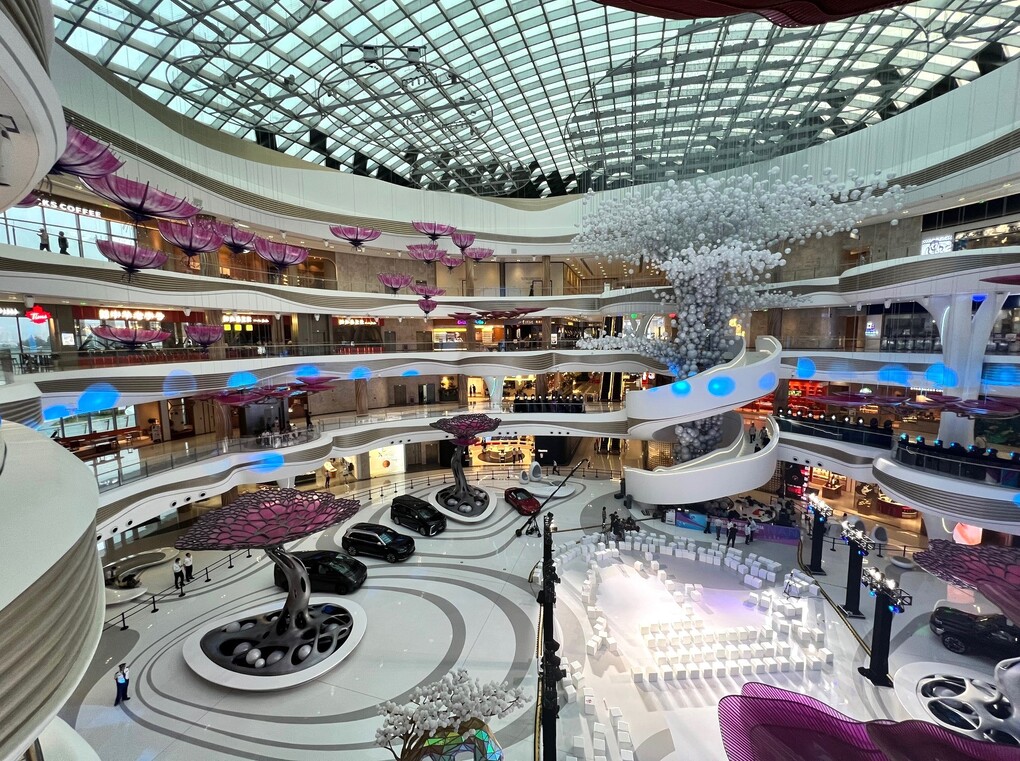 Introduction: It’s almost one year since Shilla IPark duty free opened for business in Yongsan, Seoul. This weekend the HDC Shilla Duty Free joint-venture retailer (a partnership between The Shilla Duty Free parent Samsung and Hyundai Development Company) hopes to celebrate the anniversary by securing a second Seoul duty free licence in the city’s southeastern Samseong-dong area of Gangnam.
Introduction: It’s almost one year since Shilla IPark duty free opened for business in Yongsan, Seoul. This weekend the HDC Shilla Duty Free joint-venture retailer (a partnership between The Shilla Duty Free parent Samsung and Hyundai Development Company) hopes to celebrate the anniversary by securing a second Seoul duty free licence in the city’s southeastern Samseong-dong area of Gangnam.
As reported, five companies (the others are Lotte Duty Free for its World Tower complex, SK Networks/WalkerHill Duty Free, Hyundai Department Store and Shinsegae Duty Free) are locked in a titanic struggle for the three licences set aside for major retail players in Seoul.
“We will create a duty free shop targeting young tourists who are seeking independent and distinctive travel experiences, offering product lines and shop layouts that are completely different from existing duty free shops”
HDC Shilla Duty Free said this week that, if successful in its bid, it will open an “IT-fusion” store featuring Samsung’s cutting-edge technologies. It described the planned store as a “Millennial duty free shop for future generations” and promised a “digital innovation” offer.
It will provide approximately 13,000sq m of duty free space from the first floor to the sixth floor. The key target audience is the Chinese FIT sector, particularly younger (20–35) consumers.
The retailer said: “We plan to create a duty free shop targeting young tourists who are seeking independent and distinctive travel experiences, with product lines and shop layouts that are completely different from the existing duty free shops. Domestic flagship stores, new designers and K-drama editing shops will be featured and lifestyle products that commercialise Korean culture and life will be offered.”
In a bold statement of intent issued to media, joint Managing Directors Yang Chang-hoon and Lee Gil-han said: “We will introduce a new paradigm of duty free shops which will provide a growth engine for the next 100 years.” The alliance plans to use Samsung Electronics’ 5G mobile communication knowhow in the industry’s first merged reality technology, as well as Samsung SDS’s artificial intelligence and machine-learning capabilities.
HDC Shilla plans to focus on three core Korean values and skills: “joy”, “a new experience” and digital technology.
“For example,” it said, “if foreign tourists who visit our duty free shop enter their simple taste preferences inside the merged reality fitting room, artificial intelligence will suggest the most suitable fashion choice. It will also guide them to popular tourist destinations and restaurants.”
[Shilla IPark duty free’s ‘I live colorfully’ commercial features some famous Korean faces]
The new store will boast a strong focus on Korean attractions, culture, cuisine, crafts, drama, beauty and fashion. A K-Heritage Zone will embrace the country’s history and scenic attractions through the use of “state-of-the-art” digital media, while a K-Pop Zone will highlight Korea’s hugely popular modern music scene.
The company even plans a ‘4k-Product’ shop offering K-cosmetics, K-bags, K-culture, K-food and health.
Should it be successful second time around, the retailer will no doubt bring many of its learnings from the existing store, which Martin Moodie visited recently to bring you this photo-journalistic report.
[dvgallery id=”161395″ vertical=”no”]
When Shilla IPark duty free opened last December its joint-venture partners described it as “a new milestone in Korean duty free”. Certainly the store is impressive on many levels (literally and figuratively). The range is vast; the focus on ‘Koreana’, especially Hallyu marketing, impressive; the category and brand mix innovative; the dedication to service constant.
HDC Shilla Duty Free President Gil Han Lee predicted at the time of the opening that Shilla IPark Duty Free would hit US$500 million in first-year sales, and US$1 billion within five years. The performance hasn’t quite reached those levels yet, and losses have been heavy – partly due to surging Chinese travel agent commissions in the wake of the escalating number of duty free retailers. But business is picking up, and the retailer is confident that as awareness of the store increases and transport links improve, then so too will business.
The first impressions are certainly favourable. There’s space, style, a wide range of beauty brands (Chanel is the obvious omission) and some of the highest ceiling heights in Korean duty free – a big contrast with the space-constrained Shilla flagship store.
However, sales of just under US$215 million in the first nine months indicated that there is considerable room for improvement. September was better though, with US$40.7 million in turnover – not far short, if annualised, of the hoped-for full-year result. Chinese customers generated an overwhelming 88% of sales, a now not atypical market share among Korean travel retailers. The industry jury is certainly still out on whether Yongsan will attract FIT business (still running at only 10% – but initially it was only 2%, so there has been progress) in the projected numbers necessary to attract certain absentee brands; but the partnership is quietly confident of sustained growth.
If you’d suggested to anyone a few years ago that Korean skincare brands would be anchoring the main beauty floor you’d have been considered delusional.
Certainly Yongsan is considered one of Seoul’s most upscale districts, and it enjoys decent accessibility to most of the sprawling metropolis’s major attractions. Some 50% of the capital’s major hotels lie within a 7km radius of the store, and a further 2,000 rooms are set to be built in the near future. Crucially, too, a train line to Incheon International Airport will open soon.
The store embraces the third through to seventh floors, with customers entering at level three into the key perfumes & cosmetics department.
Here it’s a combination of international brands and – the real store hot-spots – the blockbuster Korean skincare names such as Sulwhasoo and Whoo. There’s also a section set aside for fashion watches (more upscale timepieces are housed on the sixth floor).
The first impressions are certainly favourable. There’s space, style, a wide range of beauty brands (Chanel is the obvious omission) and some of the highest ceiling heights in Korean duty free – a big contrast with the space-constrained Shilla flagship store in Jung-gu, Seoul.
The Moodie Davitt Report’s visit starts at 9.30am on a Wednesday in early November, just half an hour after opening. Hardly a peak period: but already there’s a steady flow of Chinese travellers, a mix of FIT and (mainly) group tourists. And it’s immediately clear where their major interest lies – in the red-hot Korean skincare duo of Whoo (from LG) and Sulwhasoo (Amore Pacific).
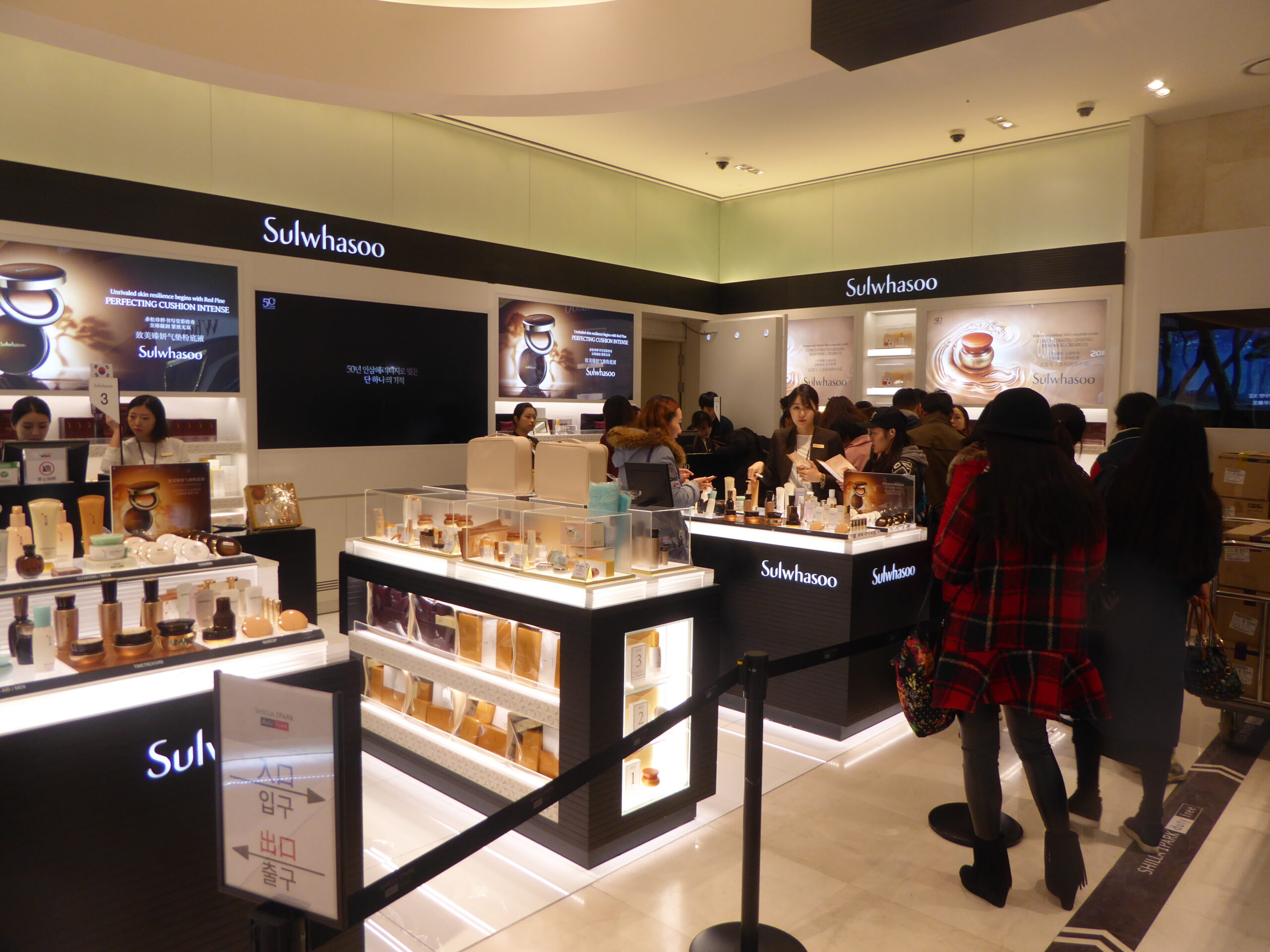
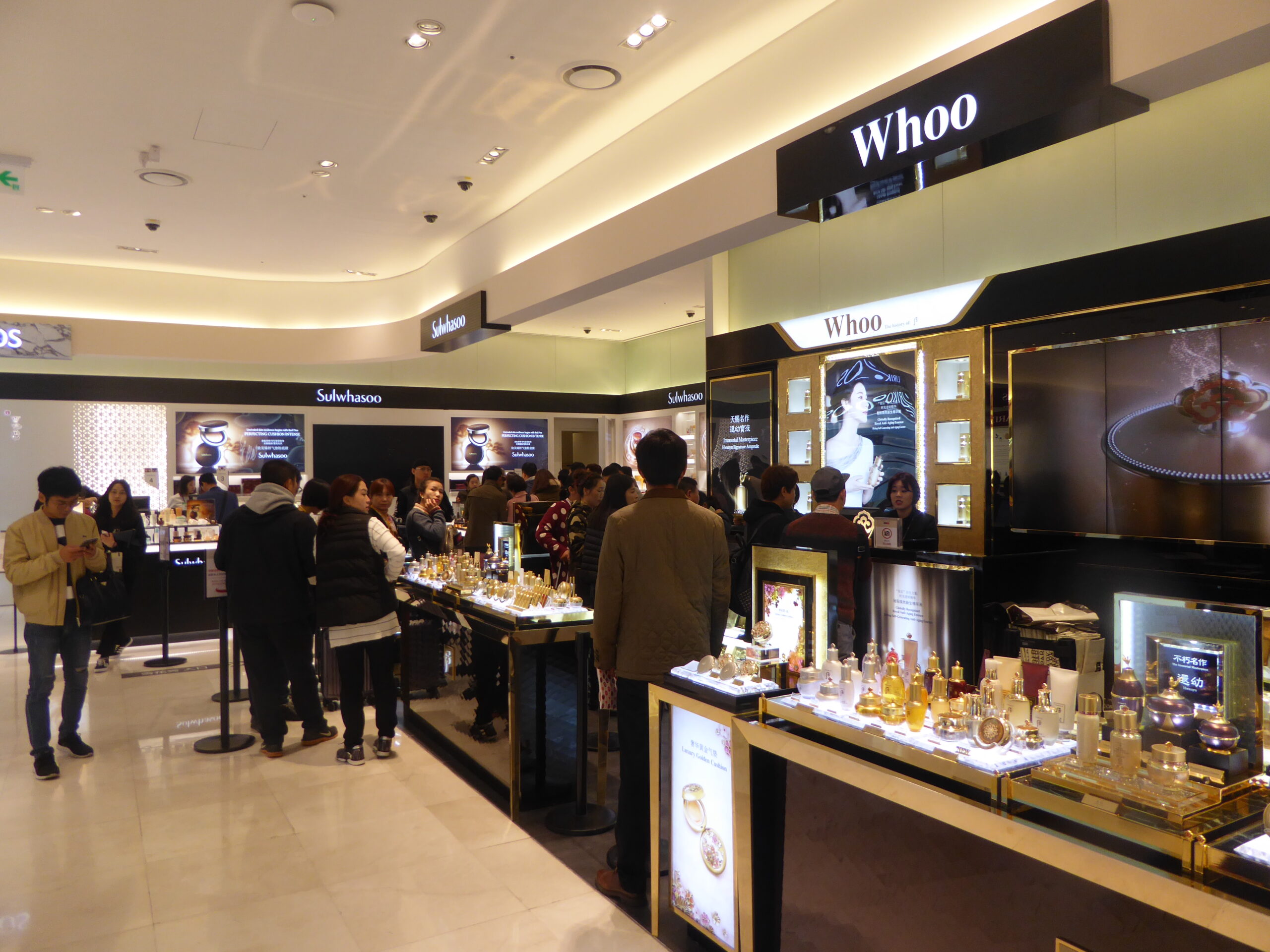
Each brand counter is surrounded by a mob of expectant shoppers, all carrying (and checking) cell phones, most of them using mobile instant messaging, and many wielding long shopping lists. This is the new reality of Korean duty free – one that is playing out all over the country. At one point I look down a long aisle, featuring some of the world’s biggest international brands on either side, and know that I could send a bowling ball down the middle and not be in the slightest danger of hitting a customer. Turn the corner to the Whoo or Sulwhasoo counters and the sporting analogy switches to that of a rugby scrum.
I watch a young Chinese woman clutching onto four Shilla IPark shopping bags, all crammed to overflowing with Korean skincare items
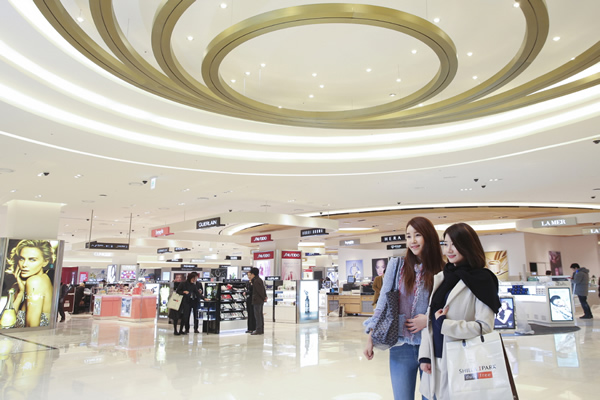
Such is the popularity of Sulwhasoo and Whoo that they can be found not only mixing it with their heavyweight international rivals but also on the dedicated K-Beauty floor above. I have been travelling to South Korea every year since 1989. If you’d suggested to anyone a few years ago that Korean skincare brands would actually be anchoring the main beauty floor you’d have been considered delusional.
In the capable hands of Assistant Manager Su Kyung Kim and Marketing Team Associate Won Young Kim I take a floor-by-floor tour that tells me much about the trends underpinning Korean duty free. The shopping scenes are almost as big an advertisement for the mobile phone industry as they are for Korean skincare and fashion, with seemingly every Chinese shopper glued to a device.
The two Korean brands’ modest counter areas are surrounded by mobs of expectant shoppers, all carrying (and checking) mobile phones, most of them using mobile instant messaging, and many wielding long shopping lists. This is the new reality of Korean duty free, one that is playing out all over the country.
As in all stores here, many shoppers have suitcases with them or large holdalls (they are permitted to take Korean items with them, whereas international brands have to be picked up at the airport) and the purchasing is fast, frenzied and fulsome. I watch a young Chinese woman clutching onto four Shilla IPark shopping bags, all crammed to overflowing with Korean skincare items.
[dvgallery id=”161412″ vertical=”no”]
Floor four houses luxury fashion and some luxury jewellery. Gucci, which opened a few days after my visit, is the latest big name to be added to the all-important roll-call of brands; Burberry opens this month. The retailer remains optimistic of securing a duplex boutique for the all-powerful Louis Vuitton, though The Moodie Davitt Report understands the LVMH house has still to finalise its options for next year (it is closing its Dongwha Duty Free door, and Shinsegae Duty Free also hopes to land the brand. Additionally, if Lotte Duty Free World Tower regains its licence this weekend, it would expect to reopen the Louis Vuitton boutique which it formerly operated).
It’s clear that Shilla IPark duty free will be a key part of South Korea’s travel retail landscape for years to come. The only question is whether it will be with one shop, or two.
The outcome of the Louis Vuitton discussion will affect other brands too, due to the space required by the luxury colossus. Several brands are currently trading out of temporary stores as a result, but all positions should be finalised by mid-2017.
As we walk the floors, one word keeps coming to mind – elegance. This is a very different store to anything else in Korean duty free: brighter, less frantic, more space. More like a department store in fact. Peak periods, of course, may change the ambience significantly, but it’s impressive nonetheless.
A dedicated VIP zone is set aside for Shilla IPark duty free members, where guests can sip some special teas and relax in an atmosphere of tranquility and refinement. “We are very, very proud of this space,” says Su Kyung Kim. To date the retailer has around 50,000 Chinese VIP members. For the really high-end shoppers Shilla IPark duty free even offers a VVIP room, offering a range of pampering services and Korean hospitality.
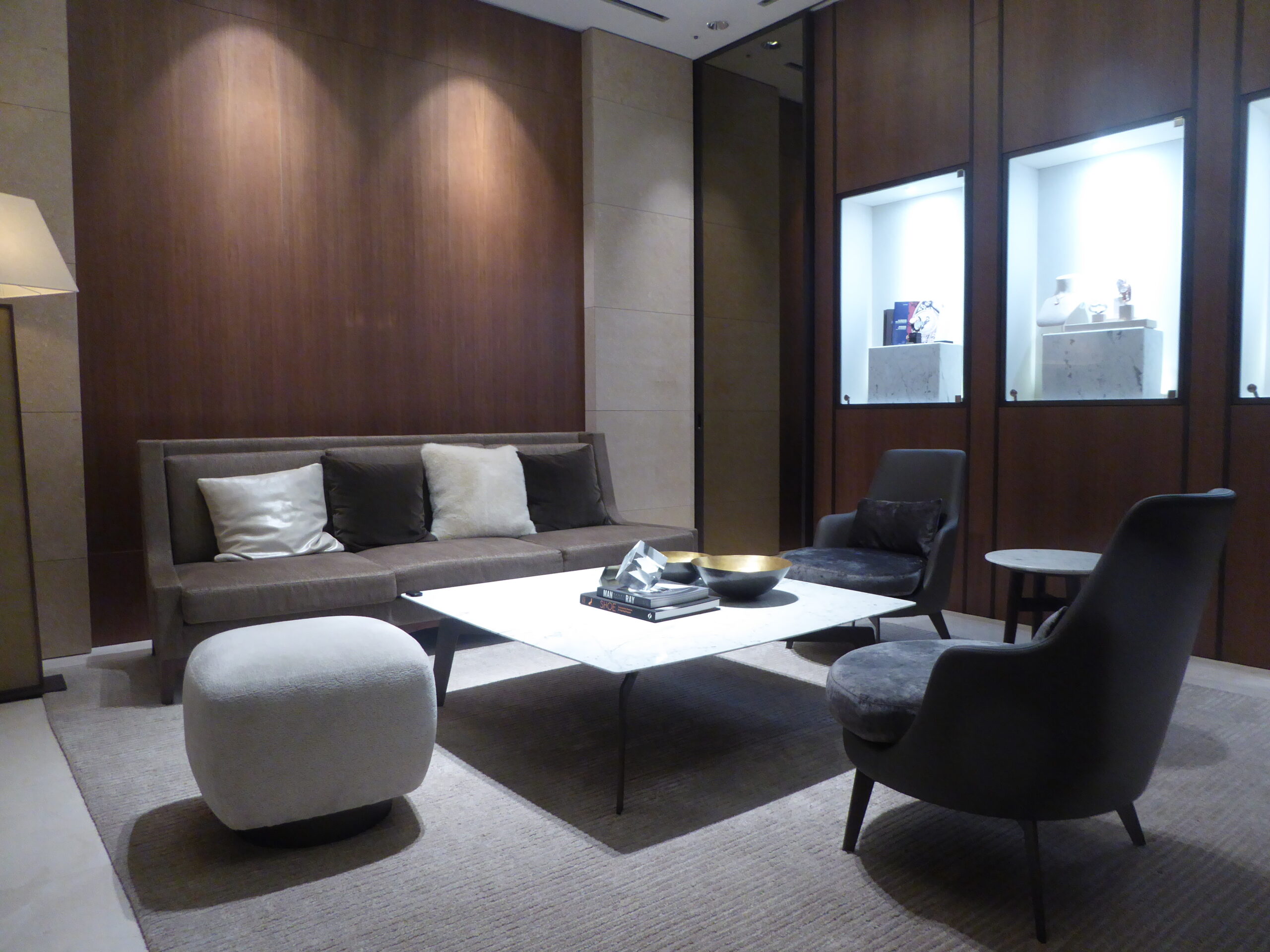
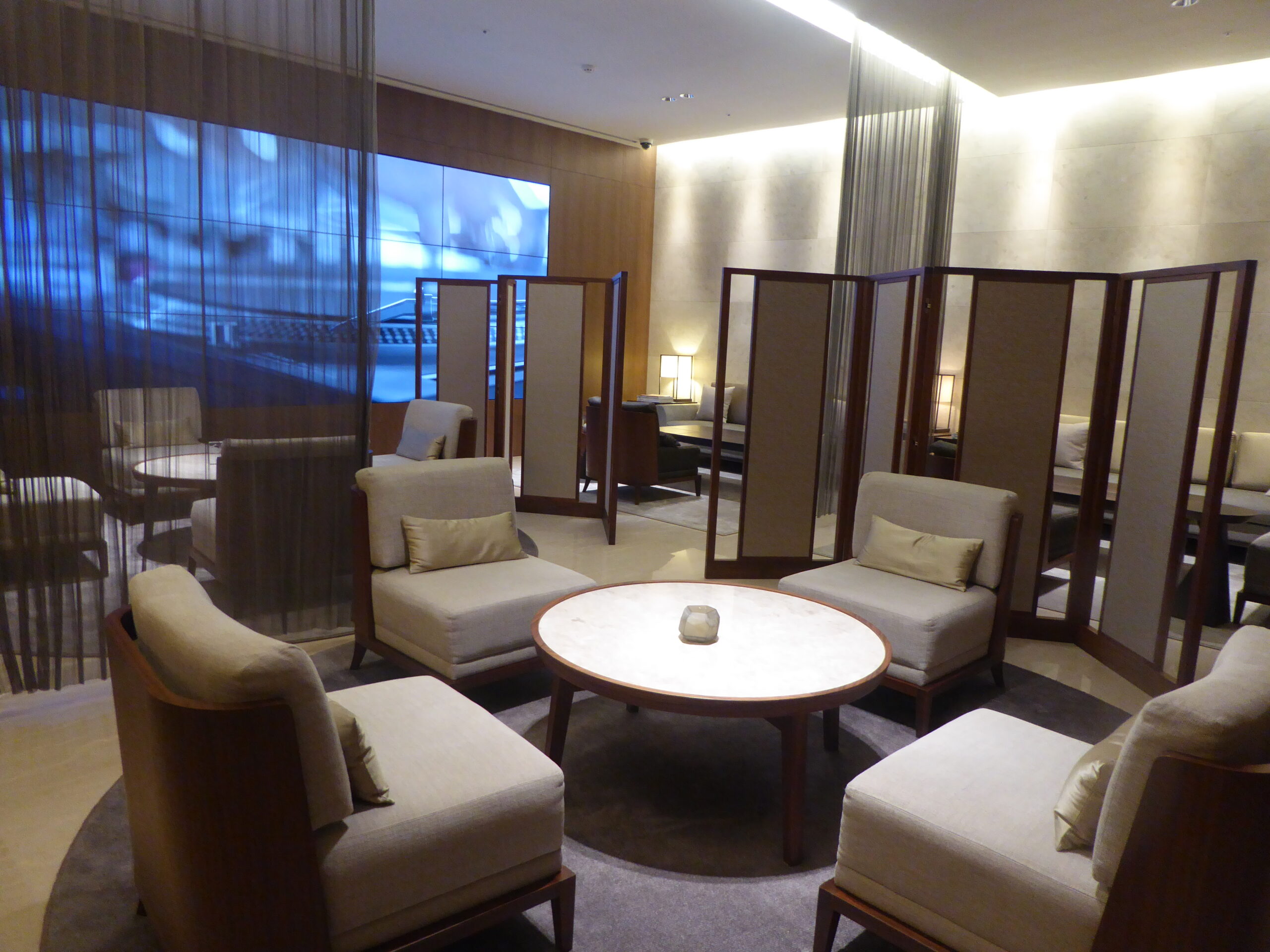
Like all its rivals, Shilla IPark duty free is seeing a rapid evolution in Chinese buying habits. The original obsession with nothing but luxury labels is broadening into other areas, notably outdoor clothing and high-end shoes. Given such a fickle consumer base (many buying not for themselves but for others), spotting such trends early is crucial.
With three more licences to be awarded this weekend, life isn’t going to get any easier for Shilla IPark duty free. Even if it wins a second licence itself, it faces a brutal power struggle for control of the group tour business and a costly, complex battle to woo the FITs.
But given the sheer clout of the two joint venture partners, their willingness to invest and their strong links with the Chinese tourism industry, it’s clear that Shilla IPark duty free will be a key part of South Korea’s travel retail landscape for years to come. The only question is whether it will be with one shop, or two. Saturday will reveal all.









